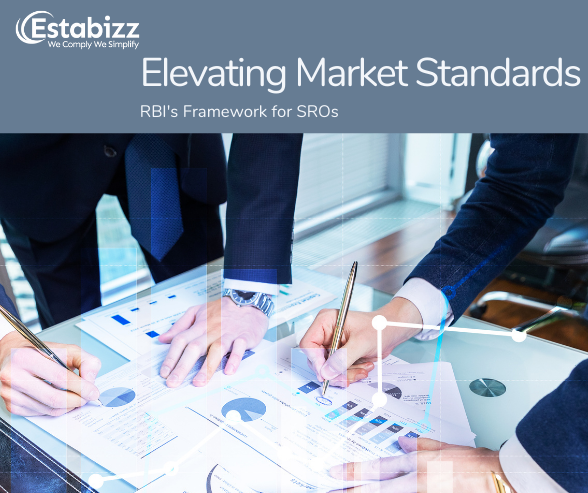RBI’s Framework for SROs: Elevating Financial Market Standards
At Estabizz Fintech Private Limited, our commitment is to demystify and navigate complex financial regulations for global businesses. Among these, the Reserve Bank of India’s (RBI) framework for Self-Regulatory Organizations (SROs) is pivotal for firms operating in or entering the Indian financial markets. Let’s delve into the key regulations of the RBI’s framework, ensuring clarity and empowering your business with the knowledge to leverage these directives effectively.
Introduction to the Self-Regulatory Organization (SRO)

An SRO stands as an autonomous institution, operational with complete impartiality and devoid of influence from any individual member or collective group. The essence of an SRO is its ability to establish and enforce professional and ethical standards within its members through binding membership agreements. In light of the financial ecosystem’s evolution, the RBI’s recent initiative invites applications, notably from non-banking financial corporations (NBFCs) and fintech firms, to be recognized as SROs. Such recognition aligns with the broader objective of enhancing compliance, fostering market development, protecting stakeholder interests, and driving innovation.
The engagement of SROs with the RBI arises from the need to work collaboratively in monitoring compliance, predicting and mitigating early warning signals, and shaping the financial markets with a forward-looking stance. Ultimately, an SRO is vested in the collective advancement and resolution of critical industry issues within the expansive financial framework.
Comprehensive Guide to RBI’s SRO Framework
In March 2024, the RBI formulated the ‘Omnibus Framework for Recognition of SROs,’ a significant stride towards establishing a robust regulatory environment. This section outlines the salient regulations and eligibility criteria encapsulated in the RBI’s framework:
- Application Submission:
Prospective SROs should submit their application via email or post, directed to the RBI’s Central Office. This is the first step towards gaining recognition and operating as a sanctioned self-regulatory organization within the financial market sector. - Eligibility Criteria:
For an entity to qualify as an SRO, adherence to the following criteria is mandatory:
- Not-for-Profit Structure: Entities must operate as not-for-profit organizations, registered under Section 8 of the Companies Act, 2013, with a minimum net worth of ₹10 crore. This financial baseline ensures the entity’s capabilities in sustaining SRO responsibilities effectively.
- Voluntary Membership: Membership to the SRO should be voluntary, emphasizing the organization’s democratic and inclusive approach.
- Diverse Membership: A prospective SRO should represent a broad spectrum of the sector or market, including a variety of entity types and sizes. A clear roadmap for achieving representative adequacy, if not immediately met, should be articulated.
- Directorship Integrity: The entity and its directors are expected to uphold professional competence, fairness, and integrity, with no history of convictions in moral turpitude or economic offenses.
- Fit and Proper Criterion: Beyond the stipulated requirements, the entity must overall qualify as fit and proper for the acknowledgment as an SRO, as evaluated by the Reserve Bank.
- Additional Conditions by the Regulator: The RBI reserves the right to impose any further conditions deemed necessary to ensure that the SRO’s operations align with public interest standards.
In conclusion, the RBI’s framework for SROs is a cornerstone in strengthening the financial markets’ integrity and efficiency. At Estabizz Fintech Private Limited, we stand ready to guide your business through the intricacies of this framework, aligning your operations with regulatory excellence and paving the way for unprecedented growth in the global financial landscape.
Estabizz Fintech compiled the material in this article using the most recent Acts, Rules, Circulars, Notifications, Provisions, Press Releases, and material applicable at the time. They ensured the completeness and correctness of the material through due diligence. When using this material, users must consult the relevant, applicable legislation. The given data may change without prior notice and does not constitute professional advice. Estabizz Fintech disclaims all liability for any results from the use of this material.





